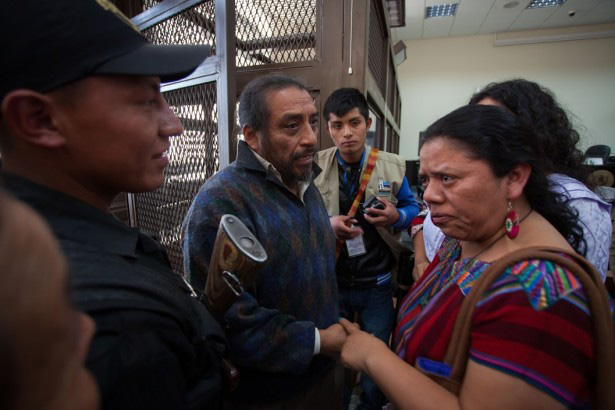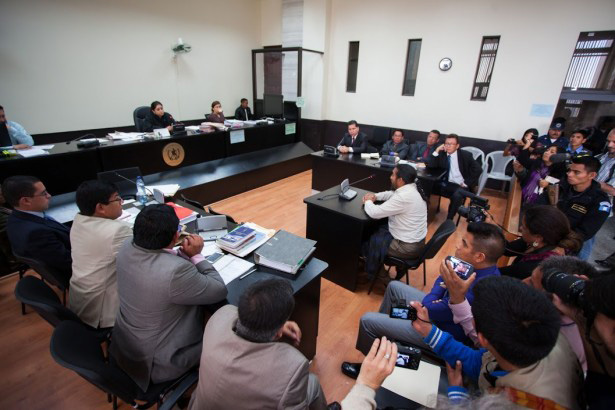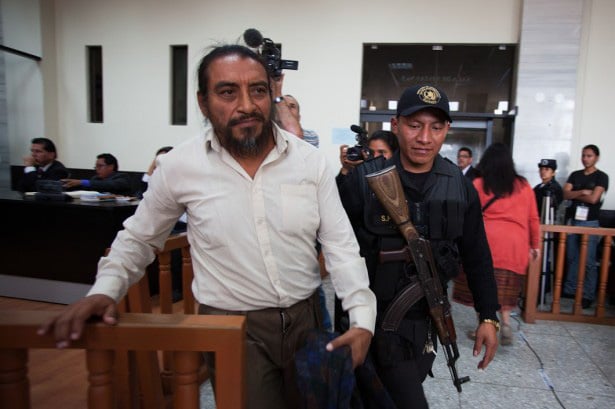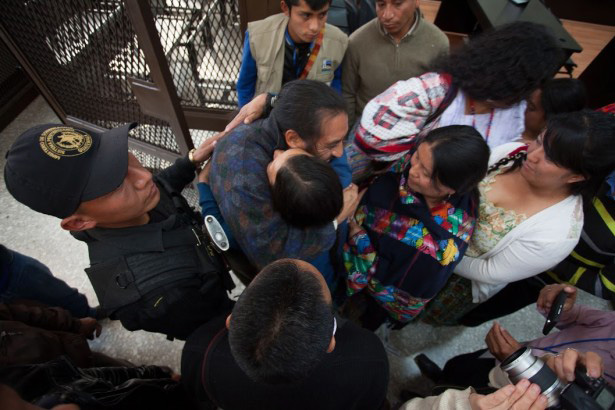
Below the Tribunal Towers in Guatemala City, within the first level of the parking garage, are the cells where those accused of crimes are held prior to court hearings. At the gate to one of the cells stands Rigoberto Juarez, a 62-year-old Maya Q’anjab’al, indigenous authority and spiritual guide from Santa Eulalia in the department of Huehuetenango. At his side stands Domingo Baltazar, another community leader from Santa Eulalia. The two don’t look like the other prisoners in the holding cell, but the two have been accused of committing horrible crimes for the leadership in their community’s struggle against the transnational companies seeking to construct hydroelectric dams in their communities.
“For 10 months we have been incarcerated without any evidence,” Juarez said, following a hearing in January 2016. “I believe that the Public Ministry is trying to draw out this process because, in the last 10 months, they have been unable to provide any evidence against us. It is absolutely unjust.”
Both Juarez and Baltazar face a laundry list of charges, including: abduction or kidnapping, aggravated assault, instigation to commit a crime, and obstruction of prosecution, as well as clearly false charges for the murder of two men on January 19, 2015, which all witnesses state was carried out by a vehicle associated with the former mayor of Santa Eulalia. As Juarez points out, no evidence has been presented against them.
The story of criminalization reflects the lengths that the Guatemalan government will go to guarantee that these leaders remain in prison. Both Juarez and Baltazar were arrested in Guatemala City on March 24, 2015 as they walked down the street in Guatemala City’s historic center. Two days later a judge released both Juarez and Baltazar to house arrest pending an investigation by the Guatemalan Public Ministry. But as they left the courthouse, they were arrested on new charges.
Since 2007, Juarez, Baltazar and their communities of northern Huehuetenango have maintained their resistance to the construction of hydroenergy by transnational companies in their region. That year, 46,481 residents participated in a consultation over the expansion of hydro projects. By the end of the vote, 46,472 had declared their opposition to the construction of any mining or hydro project.
The Guatemalan Ministry of Energy and Mining has shown little intention in respecting the concerns of the communities of the largely indigenous populations of Huehuetenango. In 2009, the ministry approved the license for the construction of a hydro project in Santa Cruz Barillas to the Spanish firm Ecoener Hydro Energy, which also includes investments from members of Guatemala’s national oligarchy.
The Santa Cruz Barillas project is one of several projects in the region, including the Hydro Ixquisis, which is owned by the firm Promoción y Desarrollos Hídricos S.A. in San Mateo Ixtatán, and the Hidro San Luis in Santa Eulalia, which is owned by CM5 S.A.
“There are political and economic interests behind the natural resources in our territories,” Juarez said. “As more leaders and more [indigenous] authorities move to defend their rights, life, and their territory, the political and economic interests will be there to incarcerate them, like they have us.”
And there are interests involved in these projects that extend well beyond Guatemala.
This expansion of energy production comes as the Inter-American Development Bank and Washington have both reiterated their calls for an increase of energy production in Guatemala and the creation of a “regional energy market” as part of Plan Mesoamerica, which called for regional integration of infrastructures. The plan looks to interconnect the energy systems of Central America through the Central American Electrical Interconnection System.
The indigenous and mestizo communities have expressed their opposition to these projects over concerns that the communities would be displaced from their lands, and that many sacred places would be lost.
 Rigoberto Juarez, a community leader and political prisoner, speaks before a judge on January 18, 2016. (Photo: WNV / Jeff Abbott)
Rigoberto Juarez, a community leader and political prisoner, speaks before a judge on January 18, 2016. (Photo: WNV / Jeff Abbott)
“In the context of defending our territory, we are talking about the protection of water, protection of the hills, the defense of the mountains, and that means, of course, defending the air that we all breathe; and we all need oxygen,” Juárez said. “The Q’anjob’ales and the ancient Mayan nations are defending precisely this right to life, oxygen and water that we all need. We are making use of this right to defend the right of the water.”
Juarez and Baltazar are not the only ones to face criminalization for their resistance to the construction of hydroelectric plants in their community. Currently there are four other community leaders — Adalberto Villatoro, Arturo Pablo, Francisco Juan, and Hermit Bernardo Lopez Reyes — from Barrillas who all face charges for abduction or kidnapping, aggravated assault, instigation to commit a crime, and obstruction of prosecution.
Classification as a Criminal Organization
As the communities have resisted, the Guatemalan government and business interests have increasingly utilized the language of the internal armed conflict to label human rights defenders “guerrillas” and “terrorists,” and they have associated the defense of human rights with “armed struggle.” These labels have brought legal charges against community activists.
Initially, Guatemala’s Public Ministry utilized charges of “terrorism” against community leaders. One such case is that of five community leaders from San Rafael las Flores who have been active in the struggle against the Tahoe Resources Silver Mine. In 2011, the elderly community leaders were falsely accused of kidnapping, terrorism and illicit association for the kidnapping of 22 Canadian investors who were visiting the mine. They were later cleared of charges.
There was a shift in 2014 when the Public Ministry dropped the charges of terrorism against leaders of movements, but left the charges of kidnapping, illicit association and the draconian “intent to commit a crime.”
“[Since 2014], there has been an increase in aggression by the judicial system to persecute community leaders for various crimes, including the sequestering of public officials,” said Benito Juarez, a lawyer who has represented many of Guatemala’s political prisoners who have faced criminalization for the defense of the environment. “The people who are defending their territories are demanding that the judicial system function, but they are realizing that the judicial system is being put at the services of transnational companies in order to prosecute the leaders, to accuse the communities [in resistance] of crimes, and to stigmatize the communities.”
As this change in tactic was made, a study was prepared in May 2014 by the Spanish firm Ecoener Hydro Energy to map the social movement in northern Huehuetenango that is resisting the construction of the dam and classify it as a criminal organization. The document, which is titled “The Criminal Structure of Northern Huehuetenango,” then became the backbone of the prosecution of the leadership of the movement against the expansion of hydro energy in the region.
According to the document, at the top of the pyramid of the alleged criminal organization they claim is Rigoberto Juarez.
 Rigoberto Juarez is escorted back to the holding cell within the court room in Guatemala City by an armed guard. (Photo: WNV / Jeff Abbott)
Rigoberto Juarez is escorted back to the holding cell within the court room in Guatemala City by an armed guard. (Photo: WNV / Jeff Abbott)
“The Public Ministry is utilizing this document as the means to order the arrests and to accuse the leaders of the movement,” said Morales. “The company is bombarding the Public Ministry with information about the activities of the leaders.”
Widespread Criminalization Against Movements in Guatemala
But the situation in Guatemala for activists — especially for communities that stand in resistance to the expansion of extractive industries such as palm oil, mining and energy production — has become increasingly dire.
According to United For the Defense of Human Rights Defenders of Guatemala, or UDEFEGUA, human rights defenders across Guatemala have seen a deteriorating situation. According to data from the organization, by 2010, the number of cases of criminalization against social movements had begun to decline from 182 in 2007 to only 26 in 2009. But by 2013, the number of cases of criminalization steadily rose to nearly 300.
“[The criminal charges] all come with the intention of damaging the social fabric and social organization,” wrote the Convergence for Human Rights, an alliance between Guatemala based human rights organizations, of which UDEFEGUA is a member. The threat of charges and prosecution creates fear in the communities that are exercising their rights.
Other leaders and movements have faced criminalization and charges for their struggle against the expansion of extractive industries in the country.
Another target of criminalization is the United Campesino Committee of Guatemala and its leader Daniel Pascual. Both have faced accusations by Guatemala’s right wingfor being a “terrorist organization” because of their support for the indigenous Kaqchikel communities of San Juan Sacatepéquez and their resistance to the construction of a cement factory, which is owned by one of the most powerful families in Guatemala, in their territory.
In 2011, the Foundation Against Terrorism filed charges against Pascual and the campesino organization, including charges of terrorism. The case has gone as far as the country’s constitutional court. In 2015, Pascual took the case, along with other such cases, to the Inter-American Human Rights Court in Washington, D.C.
“This is not a charge for a crime, this is a charge for what I think and what I say in public,” Pascual said. “There is a grave political cost for this charge. It sets a dangerous precedent for changes against human rights defenders for what we think and what we say in the media. It is very dangerous.”
The Criminalization of Activists Across Latin America
The criminalization of activists in Guatemala is something that is reflective of a trend that is occurring across the Western Hemisphere. Increasingly, the criminalization of activists has begun to follow the narrative of Washington’s global war on terrorism. Across the region, both progressive and right-wing governments in Mexico,Guatemala, El Salvador, Honduras, Paraguay, Ecuador, Colombia and Argentina, among others, have all passed draconian anti-terrorism laws based on the influence of Washington, which has meant a return to the climates of conflicts and enemies of the dirty wars of the 1970s and 1980s.
The Brazilian congress is currently debating a change proposed to President Dilma Rousseff’s anti-terrorism laws. These changes come ahead of the 2016 Summer Olympics in Rio de Janeiro, but Brazil’s left-wing parties have decried the Worker Party’s anti-terrorism laws, which they say are “too restrictive.”
“The text [of the law] will lead to the criminalization of social protests,” Brazilian Communist party leader Jandira Feghali told the Sputnik News.
The Brazilian state has passed a series of laws since it first won the rights to host the World Cup. In 2014, the Brazilian Defense Ministry published a manual entitled, “How to Guarantee Law and Order,” which lays out how the armed forces would respond if called upon during the World Cup or Olympics. The document states that its goal during the games is to “preserve public order and safety of persons and property” through the use of military force.
One of the central concerns raised in this document is the Brazilian government’s definition of “enemy.” Harkening back to the years of military dictatorship in Brazil, the definition laid out by the Defense Ministry can be applied to “movements or organizations,” or “criminal organizations, gangs of drug traffickers” who engage in actions that “block public passageways” or spark “urban riots.”
These laws and military plans have led to an atmosphere of repression and human rights violations by state forces against protesters. A study by the Brazilian free speech organization Article 19 finds that between January 2014 and July 2015, the police and state forces were responsible for over 849 arbitrary detentions and human rights violations during 740 protests.
The use of anti-terrorism laws in Latin America can be traced back to the neoliberal experiment of Chile. Today, the anti-terrorism laws there have been at the center of debate in the administration of Michelle Bachelet, who has looked to reform the law.
The law can be traced back to the military dictatorship of Augusto Pinochet, which took power following a U.S.-backed coup against the democratically-elected socialist government of Salvador Allende. The law was originally passed by the dictatorship in 1984 at a time when it faced protests and small armed insurrections.
But since 1984, the Chilean courts have utilized these anti-terrorism laws to criminalize and to demonize the indigenous Mapuche communities that have been struggling to defend their rights as indigenous peoples, as well as their territory.
In 2014, Celestino Cordova, a 27-year-old Mapuche community and spiritual leader, was charged as a “terrorist arson” and sentenced to 18 years in prison for his alleged part in killing an elderly couple in a house fire. But Cordova’s lawyers have argued that there is not substantial evidence to hold the spiritual leader responsible for the fire.
The Inter-American Court of Human Rights in Washington, D.C. has denounced the use of anti-terrorism laws against Mapuche communities and leaders like Cordova. In 2011, the court overturned seven cases against Mapuche leaders charged with terrorism.
In their decision, the court stated, “the criminal law is contrary to the principle of legality, with a series of irregularities affecting due process, and considering their ethnicity [the charges are] unjustified and discriminatory when applied.”
They added, “The victims were tried and convicted based on legislation that has a number of ambiguities that allowed the characterization of the alleged conduct as terrorist offenses.”
Despite these irregularities, the law is still in place today, and reflects the dark history of the U.S.-backed dictatorship. Hundreds of Mapuche activists still face charges for terrorism.
Challenging the Criminalization of Social Movements
Back in Guatemala, activists have rallied to support political prisoners such as Rigoberto Juarez, just as the government has upped its campaign against social movements.
“We have tried to keep cases like Rigoberto’s in both the national and international media through organizing festivals and pressuring politicians,” said Andrea Ixchíu, an activist and independent journalist in Guatemala. “This way we are able to augment what the defense is doing. As we have seen the last 10 months, the Public Ministry really doesn’t have a case against Rigoberto, so we are trying to keep the pressure on the state.”
 Supporters embrace Juarez following the hearing on January 18, as they have following each and every trial. (Photo: WNV / Jeff Abbott)
Supporters embrace Juarez following the hearing on January 18, as they have following each and every trial. (Photo: WNV / Jeff Abbott)
And activists have kept pressure on the political elite, such as Nobel Prize winner Rigoberta Menchu, through consistent lobbying and through the independent media. Activists have also consistently called contacts in the national media as well to keep the story in the news. This has led to the Guatemalan national media reporting on the visit of delegates from the European Union to Juarez, and a visit by Menchu and 1997 Nobel Prize laureate Jody Williams in February 2016.
The movement to support political prisoners has led to the victory and release of many prisoners. On January 14, as Guatemala inaugurated its new president, Jimmy Morales, two political prisoners from Santa Cruz Barillas, Saúl Méndez and Rogelio Velásquez, were released from prison after nearly three years of incarceration on false charges of femicide. The two had been cleared of charges in October 2015, after a court in Guatemala’s second largest city of Quetzaltenango acquitted them of the charges.
The pair had received significant support and coverage thanks to activists such as Ixchíu and others, who continually kept their situation in the public eye through festivals, actions, and online campaigns.
Join us in defending the truth before it’s too late
The future of independent journalism is uncertain, and the consequences of losing it are too grave to ignore. To ensure Truthout remains safe, strong, and free, we need to raise $46,000 in the next 7 days. Every dollar raised goes directly toward the costs of producing news you can trust.
Please give what you can — because by supporting us with a tax-deductible donation, you’re not just preserving a source of news, you’re helping to safeguard what’s left of our democracy.